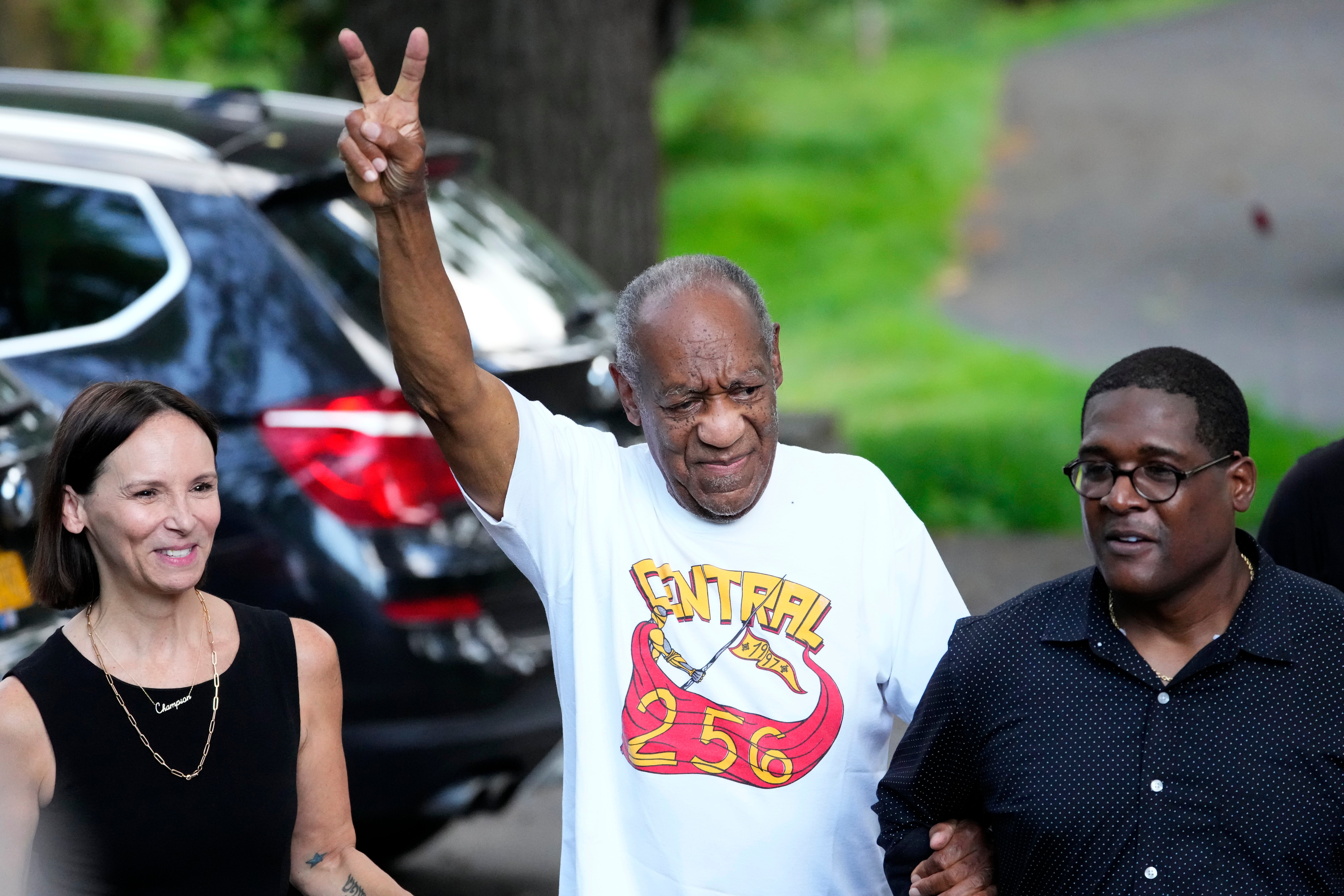Why is Britney Spears still under a conservatorship when Bill Cosby is free?
Both, until yesterday, were behind bars: one physically, the other metaphorically. Yet only Spears, who has never been accused of rape, remains shackled


If ever there was an example of the ways men and women are treated differently – even at eyewatering levels of celebrity – it can be found in the treatment of Britney Spears versus Bill Cosby.
One is subject to a suffocating conservatorship at the age of 39, and has been legally prohibited from making key choices about her personal life or her finances without her father’s consent – she even claims she has been denied permission to remove an IUD to have another child. A judge recently denied the pop star’s heartfelt request to have the conservatorship removed.
The other, 83, was found guilty in 2018 of drugging and molesting ex-basketball player Andrea Constand – and has been publicly accused of sexual assault by dozens of women (though he was only ever tried criminally for the incident against Constand). The TV comedian has now left prison after his sexual assault conviction was overturned by Pennsylvania’s Supreme Court.
Both, until yesterday, were behind bars: one physically, the other metaphorically. Yet only Spears, who has never been accused of rape, remains shackled.
This, despite the fact that Cosby’s release – which has been justified because of a “process violation” by the prosecution – is a slap in the face for any woman who’s ever been assaulted, or who has summoned the immense courage it takes to speak out publicly about being abused or violated or raped.
The TV comedian has always argued against any allegations of wrongdoing, and released a statement on social media saying thank you to his fans, supporters and friends who “stood by me through this ordeal”. “I have never changed my stance nor my story,” he said. “I have always maintained my innocence.” But he did, in 2015, admit using Qaaludes – powerful sedatives that have been compared to date-rape drugs such as Rohypnol – to pursue sex with women.
As part of his deposition during his trial, he said he used them, “the same as a person would say, ‘Have a drink.’” He also admitted he took advantage of connections with a modelling agent to meet with young women who were new to the area and “financially not doing well” – but claimed: “I think that I’m a pretty decent reader of people and their emotions in these romantic sexual things”.
His accusers don’t agree. Victoria Valentino, who claims Cosby raped her in the 1960s, said of his release: “We’re all just absolutely utterly stunned and devastated and outraged, infuriated, some in tears.” Sexual assault survivor Angela Rose described Cosby being freed as “retraumatising”. “Sexual assault is the most underreported crime in the country and examples of today just illustrate exactly why,” she said.
And that’s the rub: so often, women are damned if we do speak out, and damned if we don’t. If we do, we are pulled apart and our testimonies dissected; our clothing analysed and condemned, our levels of intoxication blamed for what is unjustly acted out against us. The phrases “she was asking for it”, “she was drunk”, “she didn’t say no” or “she was wearing a short skirt” are well-trodden for a reason. Half the time, we are not believed – or even worse, we are victim-blamed for it.
If we don’t speak out, we are tacitly told we are responsible for the fact that rape convictions were at a record low in England and Wales in 2020; that only 1.6 per cent of rapes recorded by police in England and Wales are currently prosecuted, the lowest proportion for any crime.
But is it any wonder women are hesitant to say anything at all, when it doesn’t make enough of a difference, and is woefully unlikely to end in prosection? Is it any surprise us women choose not to put ourselves through the trauma of being forensically examined, having DNA swabs taken, bruises and cuts and tears recorded, our statements of trauma repeated and broken down, when the perpetrators often walk free from court or prison – or never make it there in the first place?
The striking, disturbing cover of New York magazine from 2015 gives some sense of the collective feeling of betrayal: 35 women sat then, in black and white; facing the camera. Every single one of them had accused Cosby of assault. More than 60 in total have (by now) come forward with allegations of sexual misconduct against him. One Twitter user said it all with her sarcastic, simmering words: “Why didn’t you speak up?”
There are some remarkable similarities between the two famous faces, and cases: Spears told a US judge that she had been drugged and “forced to perform against her will”, which bears an eerie hallmark to the accusations waged against Cosby by dozens of victims. The only difference in the way they’ve been treated seems to be that one is a young, vulnerable woman; the other an older, powerful man.
Join our commenting forum
Join thought-provoking conversations, follow other Independent readers and see their replies
Comments
Bookmark popover
Removed from bookmarks